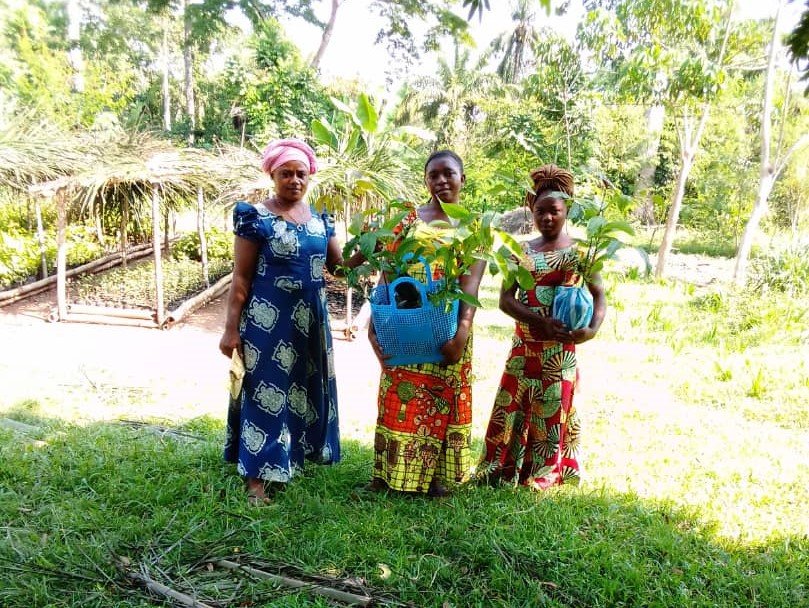Overcoming Danger and Fighting Climate Change to Protect Okapi and Forests
As 2021 comes to a close our staff has been dealing with a deterioration of security along the roads to Beni and Bunia. Vehicles are regularly being attacked by several rebel groups, taking hostages and burning cars and trucks. We have had to resort to flying staff to Beni to pick up funds, medicines and supplies then chartering flights from Mission Aviation Fellowship (MAF) to get everyone and what they have procured back to Epulu safely. The Congolese military has overseen the governments in the Ituri and North Kivu Provinces since May 2021 in an effort to bring peace to the region but has been unable to make progress due to the sheer number of rebel militias and the size and difficulty of infiltrating the mountainous and forested terrain they occupy.
The bravery of our men and women who travel on the treacherous roads to reach remote villages to bring conservation education materials, farming tools, seeds and tree seedlings is hard for us to understand as it is for them the only way to do their work to which they are extremely dedicated. OCP staff are monitoring the situation through a network of taxi drivers to avoid roads that are vulnerable to attack and time their trips to coincide when a convoy of vehicles moves together from town to town under military escort. We are hopeful that with elections not too far off, the government, with support from the UN and other countries, can eliminate the threats to commerce and human safety that have plagued eastern DRC for over 20 years.
Poor road conditions due to turbulent weather make traversing already insecure roads difficult.
A new Director General of ICCN, Olivier Musheite, has been appointed to replace Cosma Wilungula who served for over 20 years. Rosie Ruf and Berce Nsafuansa traveled to Kinshasa to meet the new DG and introduce our project and review the objectives of our programs in and around the Okapi Wildlife Reserve. They were well received and Mr. Musheite will be visiting Epulu in January. I intend to be in Epulu when he is there to discuss our 2022 work plan and budget with him and WCS and ICCN staff.
Rosie and Berce meet with ICCN Leaders in Kinshasa. (From left to right: Mr. Roger Bokwala, Rosie Ruf, Mr. Olivier Musheite, and Berce Nsafuansa).
As you have probably seen in the news the from the COP26 meeting in Glasgow that preservation of rainforests is a top priority in our efforts to sequester carbon to reduce the effects of climate change on the ability of natural systems to support life as we know it on land and in the sea. The forests of DRC, more than forests in the Amazon and in Asia, store carbon even in times of drought and rising temperatures. Preserving the forests of Eastern DRC not only provides habitat for okapi, elephants and chimpanzees but gives humans time to adjust our source of energy to be more sustainable and carbon neutral. Hopefully the Western world will financially support the countries of the Congo basin to value their immense forests as sources of life and not just another commodity to be sold.
View of the Epulu River and surrounding rainforest.
OCP’s agroforestry team in their own small way, with your support, is working with communities to restore forest trees in abandoned fields and more importantly reducing the need to cut down primary forest to provide fertile ground to grow crops. As more and more farmers apply agroforestry techniques, less land is needed to feed their families year after year resulting in more carbon being stored in the forest giants and okapi having an endless supply of leaves to eat and thick cover to shelter their offspring. We are expanding our network of tree nurseries to six by adding a tree nursery and an agronomy expert in the town of Mungbere located to the North of the Reserve giving us a presence in each major town inside and around the Reserve. Our educators working alongside the Women’s Groups in each town are encouraging more women to farm cooperatively to improve safety while in the fields and to grow cash crops they can sell in markets to earn money to support the needs of their families.
Members of the Women’s Group display some saplings from the nursery.
Helping people makes friends for conservation in the places we need them most – in the heart of the most diverse forest in Africa and the only place okapi live in the wild on earth. From all our staff to our friends and supporters we thank you for caring, you give us the means to provide for our families and give us an opportunity to contribute to the greater good of all life.
– John Lukas




